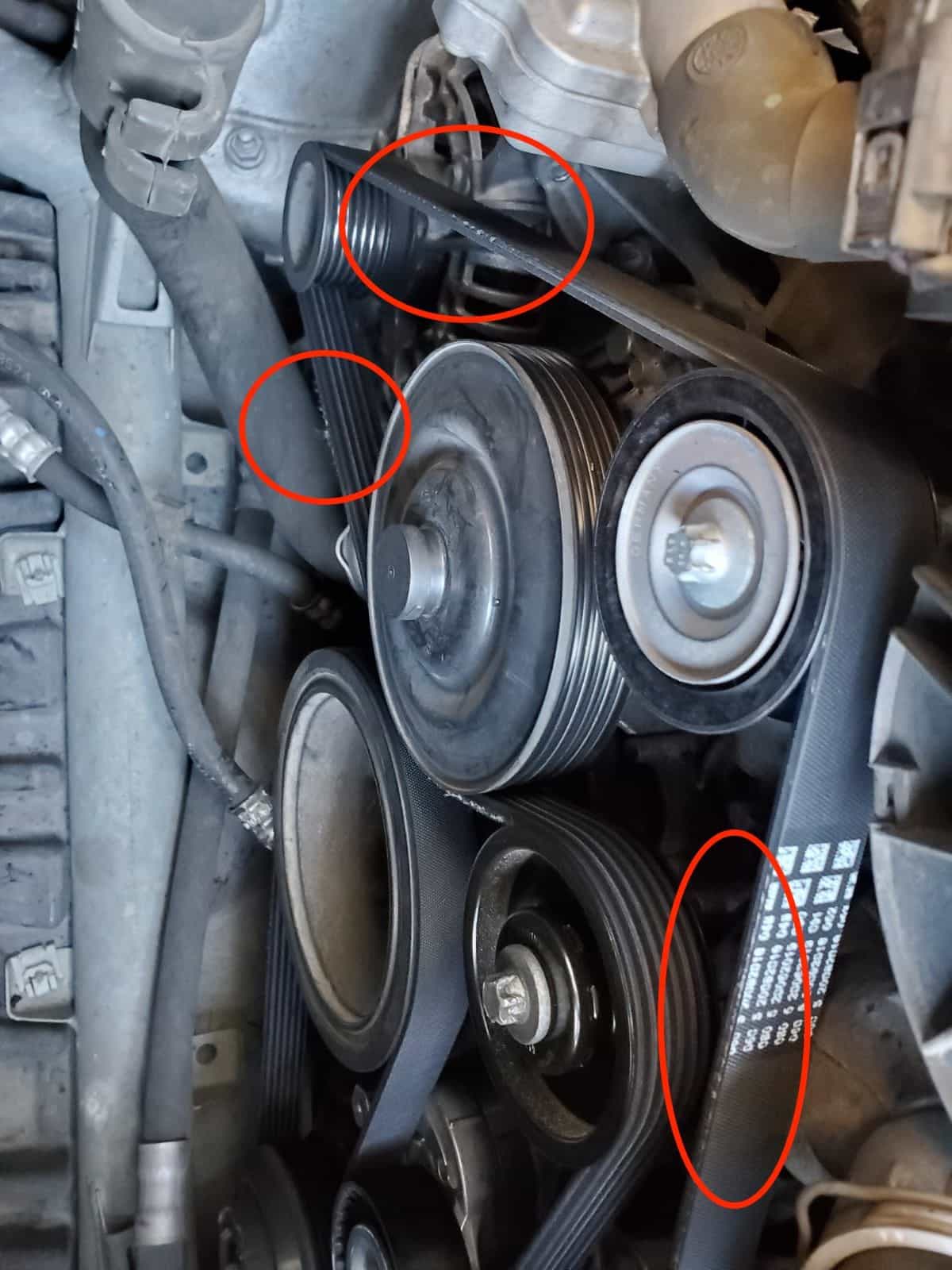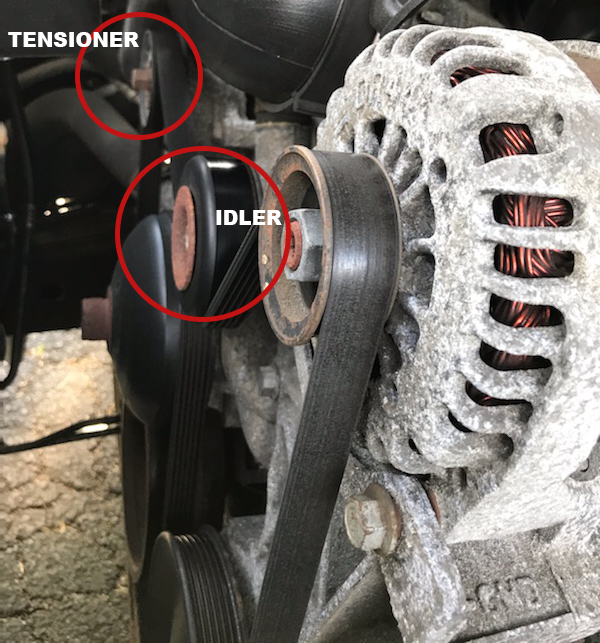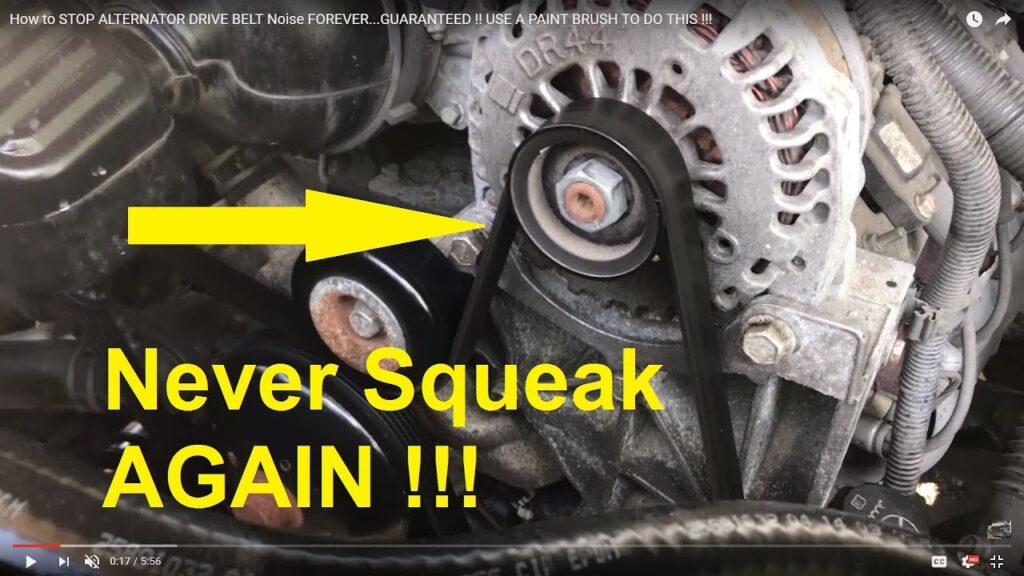A belt tensioner noise when accelerating can be a sign of a failing belt tensioner or pulley. This issue should be addressed promptly to avoid further damage to the engine.
A belt tensioner keeps the right amount of tension on the engine’s belts, and if it’s failing, it can start making a squeaking or grinding noise when the engine is running and accelerating. This noise is usually a warning sign that the belt tensioner or pulley needs to be replaced.
Ignoring this issue can lead to belt slippage, reduced engine performance, and possible engine damage. Therefore, it’s crucial to have the belt tensioner inspected and repaired by a qualified mechanic as soon as possible.
Common Causes Of Belt Tensioner Noise
Worn-out Belt Tensioner
A worn-out belt tensioner can cause noise when accelerating due to excessive wear on the tensioner mechanisms.
Misaligned Belt
If the belt is not aligned properly, it can cause the tensioner to work harder, resulting in unusual sounds.
Damaged Belt Pulley
A damaged belt pulley can lead to irregular belt movement and produce noise during acceleration.

Credit: mbworld.org
Diagnosing Belt Tensioner Noise
Belt tensioner noise when accelerating can be a sign of underlying issues that need to be addressed promptly. Diagnosing the cause of the noise is crucial to prevent further damage and ensure the smooth operation of your vehicle.
Listening For Belt Squealing
Start the engine and listen for any high-pitched squealing sound coming from the front of the vehicle.
Inspecting The Belt And Tensioner
Visually inspect the belt for signs of wear or damage, such as fraying, cracks or glazing.
- Check the tensioner for proper alignment and tension.
- Look for any signs of looseness or wobbling in the tensioner pulley.
Checking For Misalignment
Ensure the belt is properly aligned on all pulleys and pulleys are in good condition.
Effects Of Belt Tensioner Noise
When it comes to the performance and durability of your engine’s belt system, the belt tensioner plays a crucial role. However, if you notice a strange noise coming from the belt tensioner when you accelerate, it may indicate potential issues that need attention.
Reduced Belt Performance
A noisy belt tensioner can significantly impact the performance of your engine’s belts. The belt tensioner is responsible for maintaining the proper tension in the belts, allowing them to spin efficiently and transfer power between various engine components. Any abnormal noise from the tensioner could be a sign that it is not applying enough tension, resulting in decreased belt performance.
This reduced performance can lead to various problems, such as decreased power output, reduced efficiency, and even the risk of belt slippage or skipping. A malfunctioning belt tensioner can cause the belts to lose traction on the pulleys, ultimately affecting the overall performance of your vehicle.
Excessive Wear On Belt Components
Another consequence of belt tensioner noise when accelerating is excessive wear on the belt components. When the tensioner fails to apply the right amount of tension, it can cause the belts to rub against other engine parts, resulting in accelerated wear and tear.
Excessive wear on the belts can lead to a range of problems, including belt fraying, cracking, or even snapping. Damaged belts not only pose a risk of sudden failure but can also cause damage to other engine components. Additionally, the noise generated by the belt tensioner can indicate increased friction, which can lead to overheating and further contribute to the wear and tear of the belts.
To ensure the longevity and proper functioning of your engine’s belt system, it is crucial to address any belt tensioner noise promptly. Ignoring the issue can lead to more severe problems down the line, potentially resulting in costly repairs and disruptions to your vehicle’s performance.

Credit: m.youtube.com
Preventing Belt Tensioner Noise
Regular Belt Inspection And Maintenance
Regular belt inspection and maintenance are crucial in preventing belt tensioner noise when accelerating. Inspecting the belt for signs of wear, fraying, or cracks, and ensuring proper tension is maintained can help avoid potential issues.
Proper Belt Alignment
Proper belt alignment is essential for preventing belt tensioner noise. Misaligned belts can cause unnecessary stress on the tensioner and lead to irritating noises. Ensuring that the belts are correctly aligned is a key step in maintaining a quiet and efficient engine.
Fixing Belt Tensioner Noise
Dealing with belt tensioner noise when accelerating can be frustrating. The good news is that fixing the issue is possible with the right approach. In this guide, we’ll discuss some effective methods for resolving belt tensioner noise, so that you can get back to enjoying a smooth and quiet driving experience.
Replacing The Belt Tensioner
One solution for addressing belt tensioner noise is to replace the belt tensioner. Over time, the tensioner can wear out or become damaged, leading to unwanted noise during acceleration. A new belt tensioner can ensure proper tension and reduce any excessive noise caused by wear and tear.
Adjusting Belt Tension
Another method for reducing belt tensioner noise is to adjust the tension of the belt. If the belt tension is too loose or too tight, it can lead to noise when accelerating. By adjusting the tension to the manufacturer’s specifications, you can minimize noise and improve the overall performance of the belt system.
Repairing Or Replacing Belt Components
Lastly, it’s important to inspect and repair or replace any worn or damaged belt components. This can include the belt itself, pulleys, and other associated parts. By addressing any underlying issues with these components, you can effectively reduce or eliminate belt tensioner noise during acceleration.

Credit: gmb.net
Frequently Asked Questions Of Belt Tensioner Noise When Accelerating
What Causes Belt Tensioner Noise While Accelerating?
When the belt tensioner is worn or damaged, it can cause noise when accelerating due to slack in the belt or misalignment. This can lead to vibrations and squeaking, indicating potential issues with the tensioner, pulleys, or belt. Regular inspection and maintenance can help diagnose and resolve the problem.
How Can I Diagnose The Source Of The Belt Tensioner Noise?
Start by checking the tension and condition of the belt, along with the tensioner and pulleys for wear or damage. Use a stethoscope or mechanic’s stethoscope to pinpoint the noise’s location while the engine is running, helping identify the specific component causing the tensioner noise when accelerating.
Are There Any Safety Concerns Related To Belt Tensioner Noise?
While the noise itself may not pose an immediate safety risk, it could indicate potential issues with the belt drive system. Failing to address the cause of the noise promptly could lead to belt failure, loss of power steering, or other critical system failures.
Therefore, addressing the noise promptly is essential for vehicle safety and performance.
Conclusion
In short, dealing with belt tensioner noise while accelerating can be quite a nuisance. However, by understanding the causes and taking prompt action, you can mitigate the issue effectively. Regular maintenance, such as checking for wear and tear, lubricating the components, and replacing the tensioner if necessary, can go a long way in preventing further noise and ensuring smooth, uninterrupted driving experience.
Stay proactive, and your car will thank you with a quieter engine performance.
